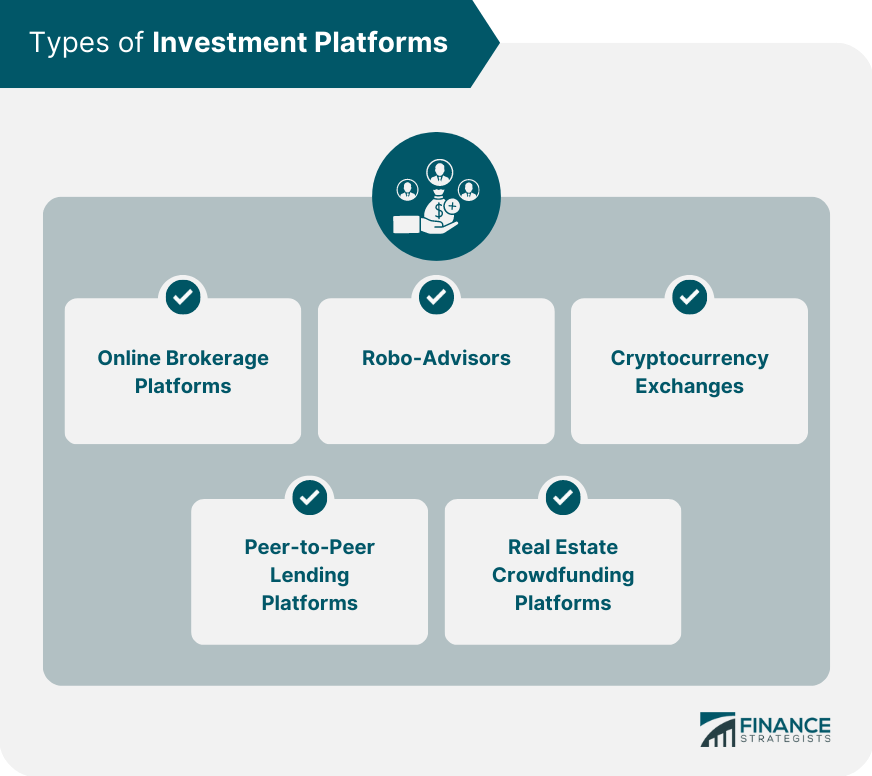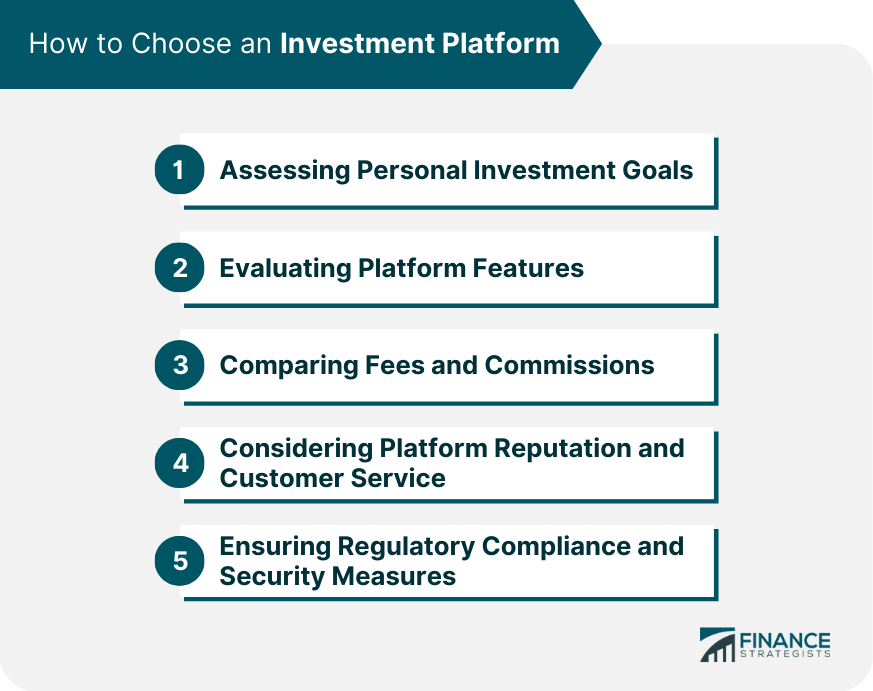An investment platform is a digital service or tool that enables investors to access and manage various financial instruments such as stocks, bonds, mutual funds, exchange-traded funds (ETFs), options, futures, cryptocurrencies, and real estate. These platforms provide a convenient and user-friendly way for investors to buy, sell, and trade assets, monitor their portfolios, conduct research, and access educational resources to help them make informed investment decisions. Investment platforms can take various forms, including online brokerage platforms, robo-advisors, peer-to-peer lending platforms, cryptocurrency exchanges, and real estate crowdfunding platforms. Each type of platform caters to different investment needs and strategies, offering a range of features, fees, and support services. Choosing the right investment platform depends on an investor's goals, preferences, risk tolerance, and desired level of involvement in managing their investments. Online brokerage platforms are digital services that allow investors to buy and sell various financial instruments such as stocks, bonds, and mutual funds. Examples of popular online brokerage platforms include E*TRADE, Charles Schwab, and Fidelity. Robo-advisors are automated investment management platforms that use algorithms to create and manage portfolios tailored to an investor's risk tolerance and financial goals. Examples of well-known robo-advisors include Betterment, Wealthfront, and Vanguard's Digital Advisor. Peer-to-peer lending platforms facilitate loans between individuals or businesses, bypassing traditional financial institutions. These platforms connect borrowers and lenders, allowing for potentially higher returns for investors. Examples of peer-to-peer lending platforms include LendingClub, Prosper, and Funding Circle. Cryptocurrency exchanges are platforms that allow users to buy, sell, and trade digital currencies such as Bitcoin, Ethereum, and Ripple. Some popular cryptocurrency exchanges include Coinbase, Binance, and Kraken. Real estate crowdfunding platforms enable investors to pool their money to invest in various real estate projects, such as residential properties, commercial buildings, and land development. Examples of real estate crowdfunding platforms include Fundrise, RealtyMogul, and CrowdStreet. Individual accounts are investment accounts opened and maintained by a single person. Joint accounts are investment accounts owned by two or more individuals, typically spouses or business partners. Retirement accounts, such as individual retirement accounts (IRAs) and 401(k) plans, provide tax advantages for long-term retirement savings. Business accounts are designed for corporations, partnerships, or other legal entities to manage their investments. Stocks represent ownership shares in a company, allowing investors to participate in a company's growth and success. Bonds are debt securities issued by companies or governments to raise capital, with investors receiving periodic interest payments. Mutual funds are pooled investment vehicles with a diversified portfolio of stocks, bonds, or other assets, managed by professional fund managers. ETFs are investment funds that hold a basket of securities, such as stocks or bonds, and trade on stock exchanges like individual stocks. Options are financial contracts that give investors the right, but not the obligation, to buy or sell an underlying asset at a specified price before a predetermined date. Futures are standardized contracts to buy or sell an underlying asset at a predetermined price and date in the future. Cryptocurrencies are digital or virtual currencies that use cryptography for security and operate on decentralized networks, such as blockchain technology. Real estate investments can include residential properties, commercial buildings, or land development projects. Research and analysis tools help investors make informed decisions by providing access to financial data, news, and market insights. Charting tools enable investors to visualize market data and trends, helping them identify potential investment opportunities. Trading algorithms are computer programs that execute trades based on predetermined criteria, such as price, volume, or timing. Mobile apps allow investors to access their investment accounts and trade on the go, offering convenience and real-time access to market information. Tutorials and guides provide step-by-step instructions and explanations to help investors learn about various investment strategies and platform features. Webinars and workshops offer interactive learning experiences, often led by industry experts, to help investors deepen their understanding of investing concepts and strategies. Market news and analysis provide timely updates on financial markets, economic events, and specific company developments. Investment blogs and podcasts offer insights and opinions from experienced investors, financial experts, and industry leaders. Some investment platforms charge a one-time fee for opening a new account. Account maintenance fees are periodic charges for maintaining an investment account, often assessed annually or quarterly. Inactivity fees are charged when an account does not meet a minimum level of trading activity over a specified period. Commissions are fees charged for executing trades, such as selling or buying stocks, bonds, or options. Spreads are the difference between the bid and ask prices of a financial instrument, representing an indirect cost to investors. Margin rates are the interest charges for borrowing money from an investment platform to purchase securities on margin. Expense ratios represent the annual cost of owning a mutual fund or ETF, expressed as a percentage of the fund's assets. Load fees are sales charges paid when buying or selling certain mutual funds, either as a front-end or back-end load. Redemption fees are charged by some funds when investors sell their shares within a specific time frame after purchase. Wire transfer fees are charged for sending or receiving money via wire transfer to or from an investment account. Currency conversion fees are charged for converting funds from one currency to another, often applicable to international investments. Withdrawal fees may be charged for transferring funds from an investment account to an external bank account. The SEC is responsible for regulating and enforcing securities laws in the United States. FINRA is a self-regulatory organization that oversees brokerage firms and their registered representatives in the United States. The CFTC is responsible for regulating the futures and options markets in the United States. Data encryption is the process of converting information into a code to prevent unauthorized access to sensitive data. 2FA is an additional layer of security that requires users to provide two separate forms of identification when logging into an account. SSL certificates provide secure, encrypted communication between a user's browser and the investment platform's server. SIPC provides limited insurance coverage for investment accounts in the event that a brokerage firm fails and is unable to return customer assets. FDIC insurance covers deposits held at FDIC-insured banks, including cash held in investment accounts. Identify your investment objectives, risk tolerance, and financial needs before selecting an investment platform. Consider the range of investment products, trading tools, and educational resources offered by each platform. Compare the fees and commissions associated with each platform, including account, trading, and fund fees, to ensure you select a cost-effective option. Research user reviews and ratings to gauge the platform's reputation and customer service quality, ensuring you choose a platform that offers reliable support. Verify that the investment platform is registered with relevant regulatory agencies and has implemented adequate security measures to protect your personal information and assets. Investment platforms play a vital role in the modern financial landscape by providing investors with the tools and resources necessary to build and manage their portfolios effectively. By understanding the various types of investment platforms, their features, and associated fees, investors can make informed decisions when choosing the right platform for their needs. Furthermore, considering a platform's reputation, regulatory compliance, and security measures will ensure a safe and reliable investing experience.What Is an Investment Platform?
Types of Investment Platforms
Online Brokerage Platforms
Robo-Advisors
Peer-to-Peer Lending Platforms
Cryptocurrency Exchanges
Real Estate Crowdfunding Platforms

Features of Investment Platforms
Account Types
Individual Accounts
Joint Accounts
Retirement Accounts
Business Accounts
Investment Products
Stocks
Bonds
Mutual Funds
Exchange-Traded Funds (ETFs)
Options
Futures
Cryptocurrencies
Real Estate
Trading Tools
Research and Analysis Tools
Charting Tools
Trading Algorithms
Mobile Apps
Educational Resources
Tutorials and Guides
Webinars and Workshops
Market News and Analysis
Investment Blogs and Podcasts
Investment Platforms Fees and Commissions
Account Fees
Account Opening Fees
Account Maintenance Fees
Inactivity Fees
Trading Fees
Commissions
Spreads
Margin Rates
Fund Fees
Expense Ratios
Load Fees
Redemption Fees
Other Fees
Wire Transfer Fees
Currency Conversion Fees
Withdrawal Fees
Regulation and Security for Investment Platforms
Regulatory Agencies
Securities and Exchange Commission (SEC)
Financial Industry Regulatory Authority (FINRA)
Commodity Futures Trading Commission (CFTC)
Security Measures
Data Encryption
Two-Factor Authentication (2FA)
Secure Socket Layer (SSL) Certificates
Insurance Coverage
Securities Investor Protection Corporation (SIPC)
Federal Deposit Insurance Corporation (FDIC)
How to Choose an Investment Platform
Assessing Personal Investment Goals
Evaluating Platform Features
Comparing Fees and Commissions
Considering Platform Reputation and Customer Service
Ensuring Regulatory Compliance and Security Measures

Conclusion
Investment Platform FAQs
An investment platform is a digital tool that allows investors to manage their investments online. It provides access to a range of investment products such as stocks, bonds, and mutual funds. The platform can be used to research investment opportunities, make transactions, and monitor the performance of investments.
Using an investment platform can provide several benefits, such as convenience, transparency, and access to a wide range of investment opportunities. Investors can manage their investments from anywhere, anytime, and have access to real-time market data and analysis.
Investment platforms generate revenue through various means, such as transaction fees, management fees, and commissions. Some platforms may also offer premium services that require a subscription fee.
Most investment platforms have security measures in place to protect users' information and assets. However, investors should always do their own research and due diligence before investing and choose a reputable and regulated platform.
Yes, many investment platforms are designed to be user-friendly and accessible to beginners. They may offer educational resources, such as tutorials and investment guides, to help users learn about investing and make informed decisions.
True Tamplin is a published author, public speaker, CEO of UpDigital, and founder of Finance Strategists.
True is a Certified Educator in Personal Finance (CEPF®), author of The Handy Financial Ratios Guide, a member of the Society for Advancing Business Editing and Writing, contributes to his financial education site, Finance Strategists, and has spoken to various financial communities such as the CFA Institute, as well as university students like his Alma mater, Biola University, where he received a bachelor of science in business and data analytics.
To learn more about True, visit his personal website or view his author profiles on Amazon, Nasdaq and Forbes.











